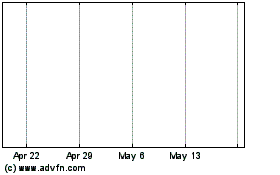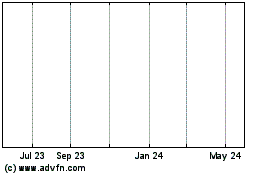Justice Department Sues ValueAct Over Disclosures
April 04 2016 - 3:10PM
Dow Jones News
The Justice Department sued activist hedge fund ValueAct Capital
Management LP for $19 million, alleging the fund failed to follow
federal disclosure rules regarding its purchases of stock in
oil-field-services companies Halliburton Co. and Baker Hughes
Inc.
In the lawsuit, filed Monday with the U.S. District Court in San
Francisco, the Justice Department said ValueAct should have sought
clearance from antitrust regulators when it purchased the stock in
late 2014 because the hedge fund sought to influence management of
both companies. Halliburton had earlier agreed to buy Baker Hughes
for $35 billion.
It is the latest hit by the government against ValueAct and
other activists over the antitrust disclosures, which activists
have long tried to avoid and fought as unnecessary.
ValueAct has twice sparred with federal regulators over such
disclosures in the past, and it earlier paid the government $1.1
million to settle similar claims, the lawsuit said. Another
activist hedge fund, Third Point LLC, last year reached a
settlement with the government over charges it breached the
disclosure rules when it purchased Yahoo Inc. shares in 2011.
In a statement, ValueAct General Counsel Allison Bennington said
the firm takes its disclosures "extremely seriously" and plans to
fight the lawsuit. The firm currently holds a 5.3% stake in Baker
Hughes and about 1.9% of Halliburton, according to FactSet.
"We have acted entirely properly and in compliance with the law.
We fundamentally disagree with the Justice Department's allegations
in this case," Ms. Bennington said. "ValueAct strongly believes in
the most basic principles of shareholder rights. This includes
having a relationship with company management, conducting due
diligence on investments, and engaging in ordinary course
communications with other shareholders."
At issue is a disclosure regime put in place by the
Hart-Scott-Rodino Act, or HSR, which requires buyers of stock worth
more than $76.3 million to alert regulators. The rule is meant to
allow the government to get ahead of any deals that may potentially
violate antitrust regulations.
Purchases of less than 10% of a company's shares that are made
"solely for the purpose of investment" are exempt from the filing
requirement. But investors can only rely on that exemption if they
are passive, or have "no intention of participating in the
formulation, determination or direction of the basic business
decisions."
What that means has been a question for activists and antitrust
lawyers for years. Most activists end up filing the notification
and lawyers tend to warn that the exemption is very narrow.
In the lawsuit, the Justice Department accused ValueAct of
planning to influence management of both Baker Hughes and
Halliburton and the structure of their merger, citing internal
emails and notes of meetings between ValueAct and executives at
both companies. The activist supported the deal, which hasn't yet
closed, and hoped to help push it through.
The suit alleges those conversations confirm ValueAct wouldn't
have fit the narrow exemption.
Brent Kendall contributed to this article.
Write to David Benoit at david.benoit@wsj.com
(END) Dow Jones Newswires
April 04, 2016 14:55 ET (18:55 GMT)
Copyright (c) 2016 Dow Jones & Company, Inc.
Halliburton (NYSE:HAL.WD)
Historical Stock Chart
From Jul 2024 to Jul 2024

Halliburton (NYSE:HAL.WD)
Historical Stock Chart
From Jul 2023 to Jul 2024
